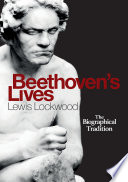

Most ebook files are in PDF format, so you can easily read them using various software such as Foxit Reader or directly on the Google Chrome browser.
Some ebook files are released by publishers in other formats such as .awz, .mobi, .epub, .fb2, etc. You may need to install specific software to read these formats on mobile/PC, such as Calibre.
Please read the tutorial at this link: https://ebookbell.com/faq
We offer FREE conversion to the popular formats you request; however, this may take some time. Therefore, right after payment, please email us, and we will try to provide the service as quickly as possible.
For some exceptional file formats or broken links (if any), please refrain from opening any disputes. Instead, email us first, and we will try to assist within a maximum of 6 hours.
EbookBell Team

4.3
8 reviewsWhen Ludwig van Beethoven died in March 1827, the world of music felt an intense loss. The composer's funeral procession was one of the largest Vienna had ever witnessed, and the poet Franz Grillparzer's eulogy brought the tensions between the composer's life and music into sharp focus: the deaf and aloof genius, the alienated and eccentric artist, unable to form a lasting relationship with a woman but reaching out to mankind. These apparent contradictionswere to attract many Beethoven biographers yet to come.
Here, Lewis Lockwood, himself a much-lauded Beethoven biographer, tells the story of Beethoven biography, from the earliest attempts made directly after the composer's death to the present day. Beethoven's Lives casts a wide net, tracing the story of Beethoven biography from Anton Schindler as biographer and falsifier, through the authoritative Alexander Wheelock Thayer and down tothe present. The list includes Gustav Nottebohm, the first scholar to study Beethoven's sketchbooks. With his work, biography could begin to reflect on the inner life of the artist as expressed in his music, and in this sense, sketchbooks could be seen as artistic diaries. Even Richard Wagner thought of writing a Beethoven biography, and the late nineteenth and early twentieth century saw the emergence of French and English traditions of Beethoven biography.
In the tumultuous twentieth century, with world wars and fractured politics, the writing of Beethoven biography was sometimes caught up in the storm. By bringing the story down to our time, Lewis Lockwood identifiestraditions of Beethoven biography that today's scholars and writers need to be aware of. As Lockwood shows, each biography reflects not only on the individual writer's knowledge and interests, but also his inner sense of purposeas each writer works within the intellectual framework of his time.